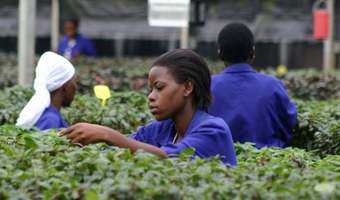 Ugandan horticulture industry has narrowly escaped a ban on its exports to European Union which had earlier accused it of non compliance of the set safety standards. The commitment by the horticultural regulatory body to rein in on errant exporters has seen the EU relax the ban. This coming at a time when Kenya’s fresh produce has faced similar bans on the grounds that its produce contains harmful chemicals.
Ugandan horticulture industry has narrowly escaped a ban on its exports to European Union which had earlier accused it of non compliance of the set safety standards. The commitment by the horticultural regulatory body to rein in on errant exporters has seen the EU relax the ban. This coming at a time when Kenya’s fresh produce has faced similar bans on the grounds that its produce contains harmful chemicals.
In Uganda, the ban which was threatening the rising sector arose when some consignments of the exports failed to comply with the phytosanitary certification requirements earlier in October 2014. A phytosanitary certification is issued to indicate that consignments of plants, plant products or other regulated articles meet specified import requirements and are in conformity with the certifying statement of the appropriate model.
The ban which was set to be implemented next month (November 2014) followed a notification from Brussels Belgium explaining the discovery of traces of live insects in hot pepper, flowers and chillies, something which is risky to human lives and is against the set safety standards. EU discovered African cotton leaf worm in roses and the false coding moth in red peppers resulting in the export ban threat.
The issuance of the caution statement to the horticultural sector and the threat of losing the lucrative EU market have fuelled heightened efforts towards eradication and curbing any future occurrence. The Horticulture players and regulators blame the unscrupulous middle men traders who are motivated by huge profits and sweeping under the carpet the prerequisite procedures for quality control.
The Horticultural Exporters Association (Hortexa) chairman, John Lule noted in earlier interview, “There are so many middlemen who have failed to follow the traceability system and instead just buy commodities from any farmer. This has ruined the quality of exports.” He further advised that normally, an exporter has to comply with traceability system so that if there is a problem-say if a chemical which is dangerous for human consumption was used, it can be linked to its source.
Following concerted effort and due diligence among the sector players, the EU has now softened its stance and halted plans to ban agricultural exports from Uganda giving the farmers, traders and the economy a lifeline. EU’s programme officer for trade in Uganda, Céline Prud’homme Madsen, explained that sanctions against Uganda have been put on hold because EU has received promising progress of action on the errant exporters. “The EU delegation in Uganda has been working in close contact with the agriculture and trade ministries on the matter. The recent implementation of the action plan seems to have had an impact on the number of interceptions at EU borders. The ban has been avoided for now.”
About 170 fresh commodity exporters and over 8000 thousand farmers involved in the export chain were set to lose out on their livelihood if the ban would have materialized. According to statistics from Export Promotion Board, over 6,500 tonnes of flowers were exported from Uganda to EU in 2013.
The government was also staring at massive revenue losses following the ban threat as because the horticulture sector is among the lucrative exchequer foreign currency earner. In 2013 the government revenues amounting to over UGX95 billion from the flower sector alone according to Export Promotion Board.
Recently in Kenya which has suffered from the ban, more than 5,000 horticulture farmers and 11 horticulture firms were banned from exporting fresh produce to the European Union (EU) market. The withdrawal of licences arose from the high levels of pesticides and other harmful organisms in their produce
















Comments powered by CComment